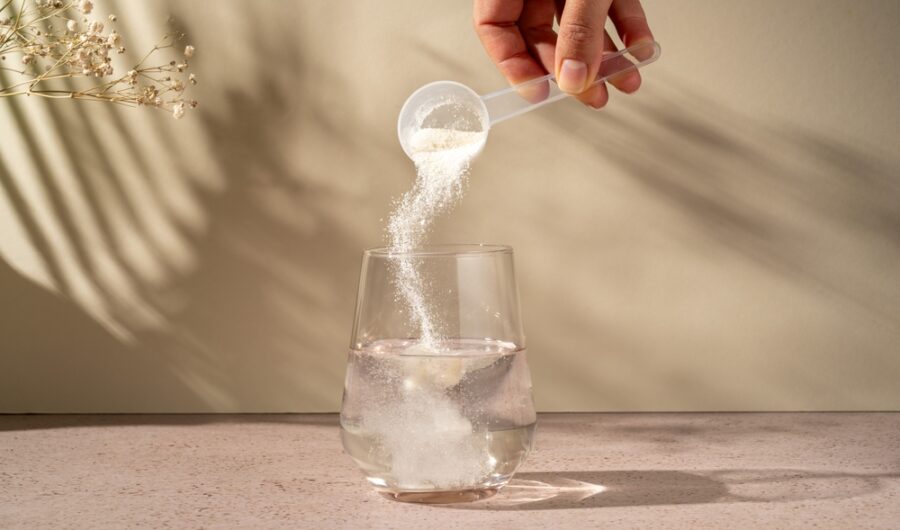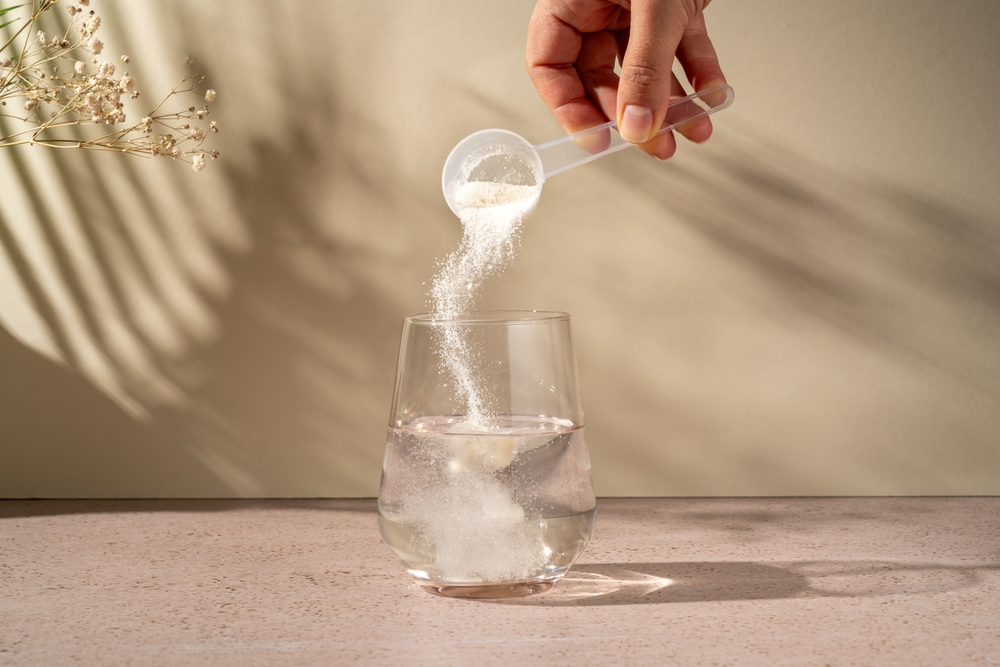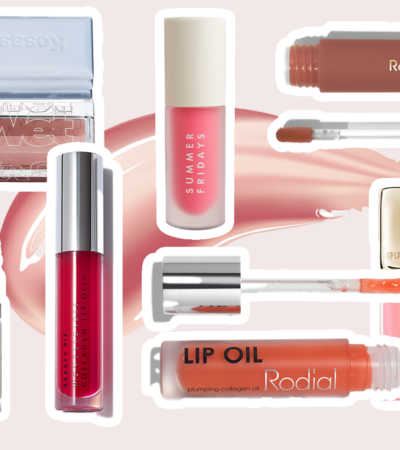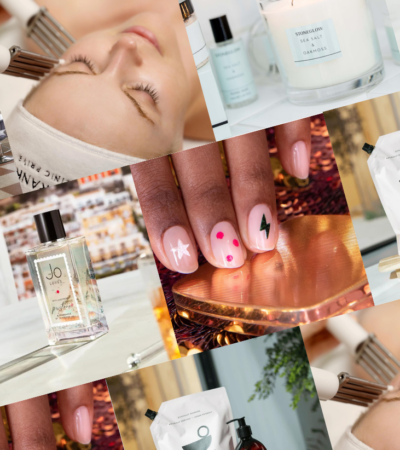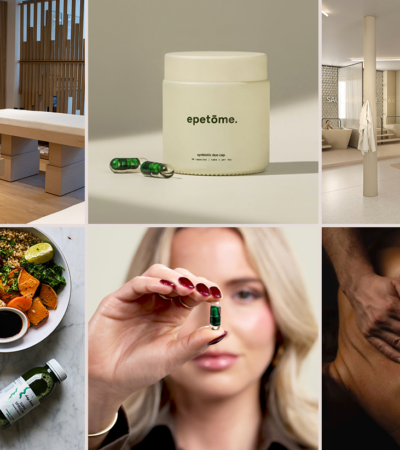These days, you can’t seem to be scrolling on social media for more than a few moments before you are hit with endless images of glowing-skinned goddess-like women advertising a beauty collagen supplement. Everyone seems to be talking about it, but we want to know what the fuss is about and do we really need to take collagen?
What Is Collagen, and Why All the Fuss?
Once just an LA beauty and wellness trend, the collagen craze has taken the UK by storm. But is it really worth the hype and the fix we are promised for more youthful skin? Health writer, Charlotte Dormon, investigates the elixir of youth that everyone’s talking about.
Collagen is the most abundant protein in our bodies, acting as a natural type of, let’s call it ‘glue’ that holds everything together—from the skin to bones, muscles, and tendons. It also acts as a natural scaffolding, providing structure and strength. But as we age – especially as we reach our 40s and 50s, our natural collagen production begins to decline, leading to the familiar signs of ageing: wrinkles, age spots, sagging dry skin, and joints that don’t seem to be as flexible or springy as they were in our 20s. Studies have also shown that stress, alcohol, excess sugar, UVA/UVB damage, illness and excessive exercise can also accelerate the rate at which our collagen declines – yikes!
The Beauty and Beyond of Collagen Supplementation
Collagen’s key role is vital in maintaining skin’s elasticity and hydration and its popularity is down to its ability to reduce wrinkles, hyperpigmentation, and dryness. Supplementing your diet with collagen can directly support the skin’s matrix, helping to enhance skin hydration and elasticity. This helps reduce the appearance of ageing and promotes a smoother, more youthful complexion. Some studies suggest that collagen peptides—commonly found in supplements—can stimulate your skin cells to increase collagen production and potentially protect against UV-induced skin damage.
Strength and Shine for Hair and Nails: Collagen provides the vital amino acids our body requires to build keratin, the protein responsible for strong and healthy hair and nails. Collagen provides a framework that helps increase the thickness and durability of the nail plate and can bind to water and maintain moisture within the nail bed, which can prevent brittleness and breakage as it improves the underlying health of the nail bed and cuticle, leading to faster nail growth. Collagen supports the health of the hair follicles on the scalp, which is valuable to prevent thinning and improve overall health and strength.
Joint Health and Fitness Goals: Collagen supports flexibility and can help alleviate joint discomfort that can be experienced from aging or after working out. It is a great supplement to improve overall joint health due to its key role in maintaining the integrity of cartilage. As the body ages, collagen production decreases, leading to stiffer and less flexible joints. Supplementing with collagen can help enhance joint function by reducing inflammation and pain associated with joint stress and degradation. As we age, our muscles start to shrink – aka muscle atrophy – so maintaining muscle mass is recommended, especially in our perimenopausal and menopausal years.
Good Gut Health: Collagen plays a significant role in supporting a healthy gut by contributing to the integrity and repair of the intestinal lining. This protein is rich in amino acids like glycine and proline, essential for maintaining the tight junctions between cells in the gut mucosa, thus preventing unwanted substances from entering the bloodstream. Additionally, collagen can help reduce inflammation in the gut, which is beneficial for conditions such as leaky gut syndrome and inflammatory bowel conditions. By promoting a strong and resilient gut lining, collagen assists in overall digestive health, facilitating the proper absorption of nutrients and minimising gastrointestinal discomfort.
Choosing the Right Collagen for You
Not all collagen supplements are created equal. Here’s how to pick the star player for your beauty and wellness routine:
Source Matters: Look for a collagen supplement that has been double-hydrolysed, as this will ensure you are getting the most bioavailable collagen peptides for easy and fast absorption.
Certifications and Reviews: Third-party testing and positive reviews can guide you to reputable products. Also, check for additional certifications that align with your dietary needs (e.g., gluten-free, non-GMO).
Quality Assurance: Opt for collagen brands that are transparent about the sourcing and processing of their labels. Organic, grass-fed, and wild-caught aren’t just trendy buzzwords but indicators of a high-quality product. When you ingest a health or beauty supplement regularly, it’s valuable to ensure you’re getting the best quality ingredients that will help you get great results without compromising quality.
Complementary Ingredients: Some collagen supplements come enhanced with vitamins, minerals, or hyaluronic acid. These can amplify the benefits, but choose according to your body’s needs.
Get Label-Savvy: We are certainly getting a little more label-savvy when it comes to checking the beauty and food products we buy these days, so be sure to take a close look at the teeny, tiny wording on the back of the collagen supplements. Many brands will use additional fillers, sweeteners, sugars, and binders that you may prefer to do without.
Liquid, Gummies or Powder: There are so many different ways to ingest collagen and no doubt you will encounter many of these on your search, but the main thing you need to check is the actual quantity of collagen peptides you are getting in your product per serving. Studies have found that you need a minimum of 10,000mg of collagen peptides each day for 1-3 months before you really start to experience results. Despite a rather delicious gummy tasting, it most likely won’t be a great choice for a woman in her 40s who wants to tackle joint pain or thinning hair as she would need to eat the whole packet just to get the daily amount required. If you want a higher dose, find a powder that will deliver more.
3 Of The Best Ways to Get Your Collagen Fix:
While the body naturally produces collagen, you can also get it from dietary sources. Here are some foods that are high in collagen or promote its production:
Bone Broth: Made by simmering bones and connective tissue, this is one of the richest sources of collagen.
Animal Meats: Particularly tough cuts of meat like chuck steak, brisket, or stew meats, which have high amounts of connective tissue.
Fish and Shellfish: The skin of fish is rich in collagen. Shellfish have parts that are made of cartilage, which is a type of collagen.
You can supplement your diet with a collagen peptide powder such as Correxiko Collagen Powder that can be mixed into foods and drinks to enrich them with collagen. When choosing a collagen supplement, you ideally want to pick one that uses not only good-quality pure ingredients but also offers at least 10,000mg per serving of collagen peptides to ensure you are getting enough to make a real difference.
words by Charlotte Dormon

